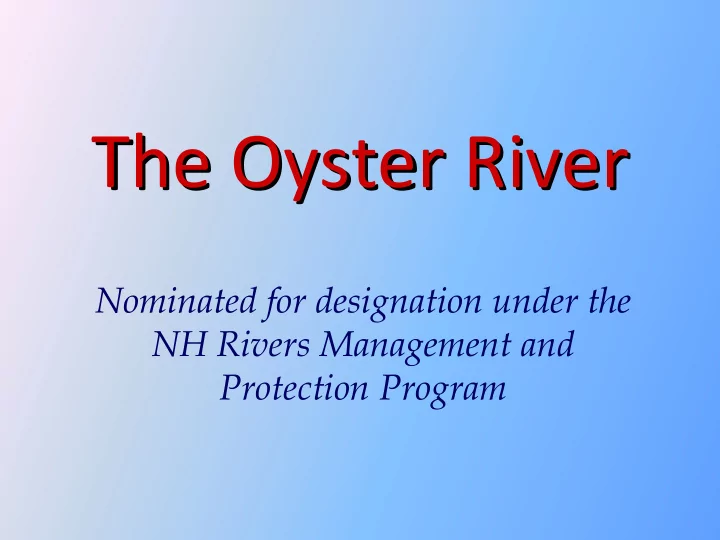

The Oyster River The Oyster River Nominated for designation under the NH Rivers Management and Protection Program
Nominating organization: Thanks to: A grant from: Special thanks to: Laura Weit-Marcum Acting Rivers Coordinator (NHDES, RMPP) Kyle Pimental GIS/Communications Technician (SRPC) All stakeholders and partners that provided technical and editorial assistance
What is being What is being proposed? proposed?
Why the Oyster River? Why the Oyster River? • Significant natural resources are associated with the Oyster River • Rapid urban development in Seacoast; water use increasing • Environmental quality of NH estuaries is declining • No formal cross ‐ town body to address water issues within the watershed
Outstanding Features Outstanding Features
Drinking Water Drinking Water • River is one of two surface water sources for Durham and UNH • Third source: a well, adjacent to Oyster River • All sources together meet mean demand of 800,000 gallons per day • Value as water source recognized by town zoning and UNH land use
Tributary of Great Bay System Tributary of Great Bay System Oyster River Great Bay (Piscataqua Region Estuaries Partnership)
Tributary of Great Bay System Tributary of Great Bay System • Great Bay Estuary threatened by nitrogen pollution • Critical to maintain high water quality in tributaries • “Environmental standards in place at the local level vary greatly, and are generally inadequate to address the pressing environmental threats to the water resources of the area.” Derek Sowers Piscataqua Region Estuaries Partnership
Pristine Floodplains Pristine Floodplains • Hundreds of acres • Critical habitat for upland and aquatic plants and animals • Serve important flood control function
Wildlife Resources Wildlife Resources Number of Taxonomic species known Likely group for watershed additions Mammals 48 16 Birds 93 50 Trees 28 ? Shrubs 34 ? Herbs >70 >100
Rare Animal Species Rare Animal Species cws • Least Bittern necottontail.com • Blanding's Turtle • Spotted Turtle • Wood Turtle • Osprey Maine Audubon • Ringed Bog Haunter • New England Cottontail • Gold ‐ Winged Warbler • Vesper Sparrow • Grasshopper Sparrow • Upland Sandpiper nrcs
Fish Fish BROOK LAMPREY BROOK LAMPREY • Endangered or threatened: – American brook lamprey (S2) – Bridled shiner (S3) • Species of concern: 7 BRIDLED SHINER – More than any other river in the state • Native brook trout • Blueback herring – Anadromous REDFIN PICKEREL REDFIN PICKEREL
Exemplary Natural Communities Exemplary Natural Communities • Atlantic White ‐ cedar swamp • Black Spruce Poor Fen • Herbaceous Seepage Marsh • Hemlock–Beech–Oak– Pine Forest • Red Maple Floodplain Forest
Scientific and Educational Value Scientific and Educational Value • Adjacent to UNH campus • Used extensively in dozens of UNH classes, hundreds of students per year • Research projects
Water Monitoring Program Water Monitoring Program • Partnership: DES (VRAP), UNH, ORWA • Since 2001 • 12 ‐ 14 sites, sampled 6 ‐ 8 times per year • 10 ‐ 15 volunteers/year • Has identified human impacts
History of Protection History of Protection • Tamposi Water Supply RMPP DESIGNATION Reserve, Barrington WOULD MAXIMIZE THE • Land protection in EFFECTIVENESS OF Durham, Lee, Madbury EXISTING LAND AND WATER PROTECTION • NRCS restoration in Lee EFFORTS!
Tamposi Water Supply Reserve Tamposi Water Supply Reserve • 1400 acres including Oyster River head ‐ waters • Purchased, in part, with a grant from NH DES Water Supply Protection Program
Community Support Community Support
Community Support Community Support • Survey of riverfront land owners – 158 sent – 21% responded 68% have owned their property for 10 yrs. or more
Community Support Community Support Landowners: Importance of river characteristics
Community Support Community Support Landowners:
Community Support Community Support Action: Action: Interest: Interest:
Community Support Community Support Barrington Board of Selectmen Planning Board Conservation Commission Durham Town of Durham Conservation Commission Lee Planning Board Conservation Commission Board of Selectmen Madbury Board of Selectmen Water Resources Board Conservation Commission UNH/Durham Water System
Community Support Community Support • New Hampshire Fish and Game Department • Piscataqua Region Estuaries Partnership • Strafford County Conservation District • The Nature Conservancy • Great Bay Trout Unlimited • Coastal Conservation Association of NH • Strafford Rivers Conservancy • Gundalow Company
Conclusion Conclusion • Oyster River has many unique features • Threatened by urbanization • No formal inter ‐ town communication about the river • Much already done to protect the river • Designation would improve communication, maximize effectiveness of what has been done
Recommend
More recommend